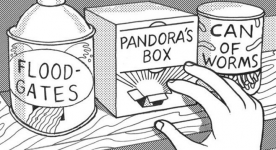MplsGopher
Well-known member
- Joined
- Nov 4, 2017
- Messages
- 36,668
- Reaction score
- 10,145
- Points
- 113
Title IX:
No person in the United States shall, based on sex, be excluded from participation in, be denied the benefits of, or be subjected to discrimination under any education program or activity receiving Federal financial assistance.
I don't see anything in there about excluding employees.
No person in the United States shall, based on sex, be excluded from participation in, be denied the benefits of, or be subjected to discrimination under any education program or activity receiving Federal financial assistance.
I don't see anything in there about excluding employees.

